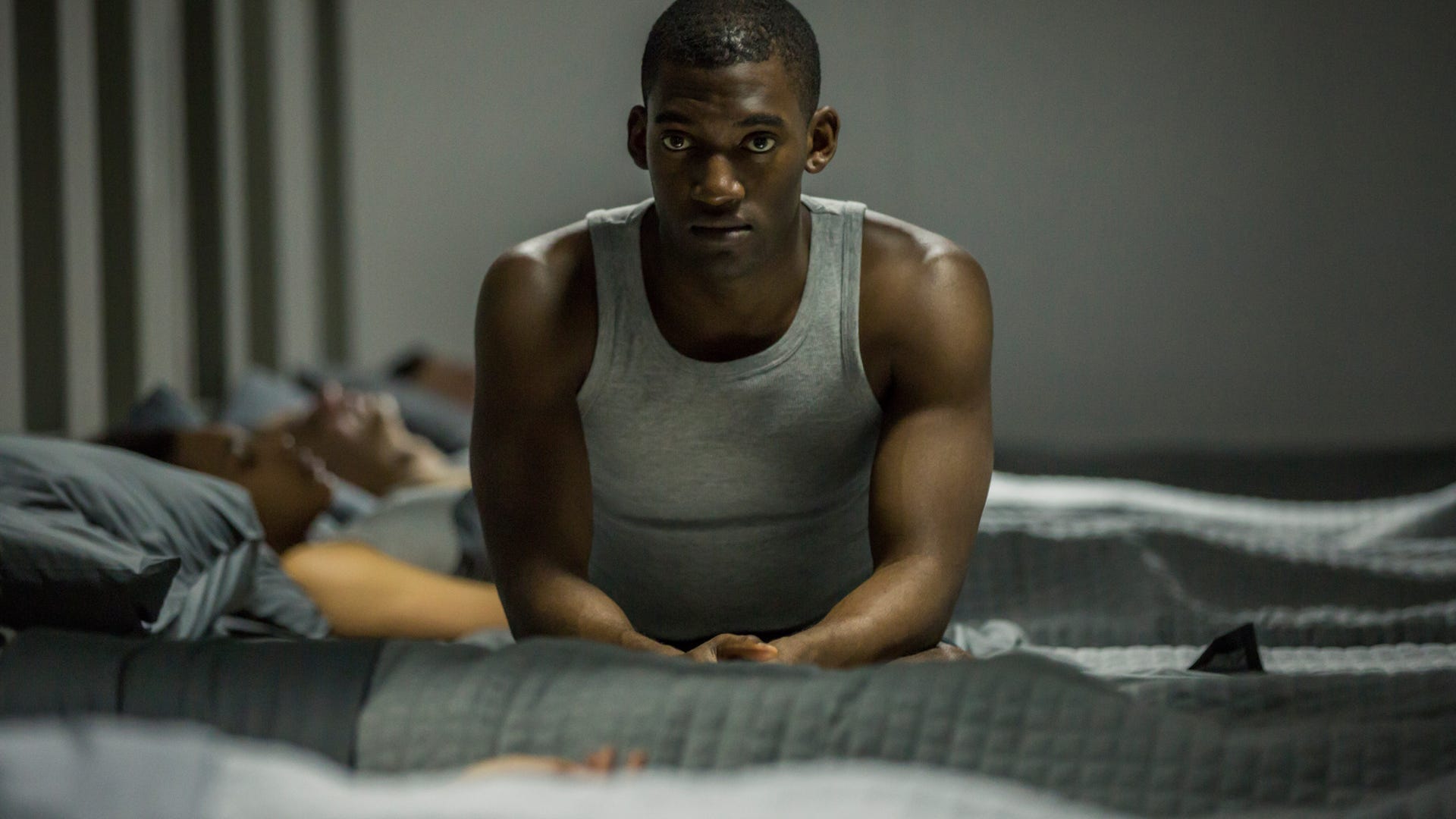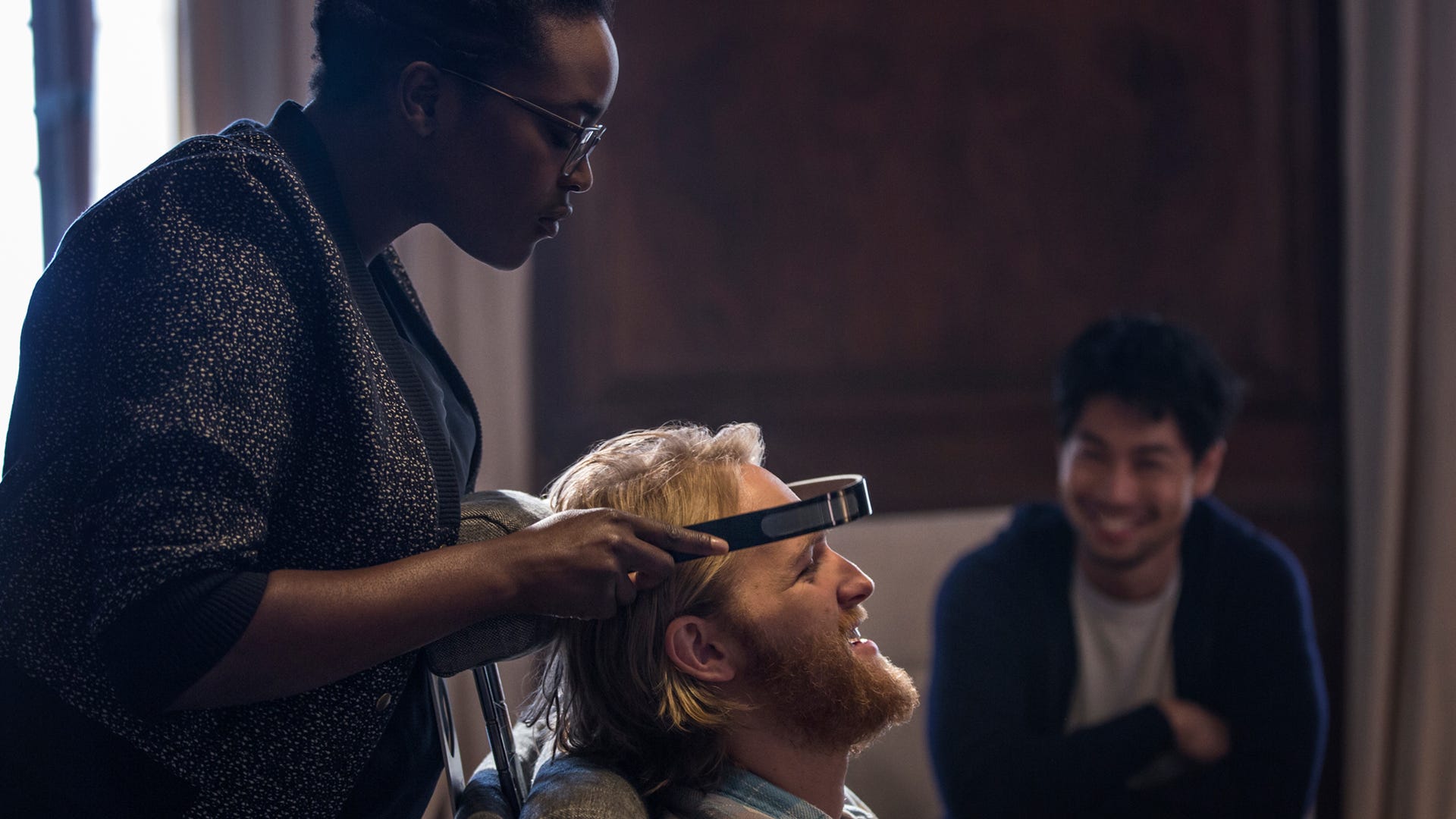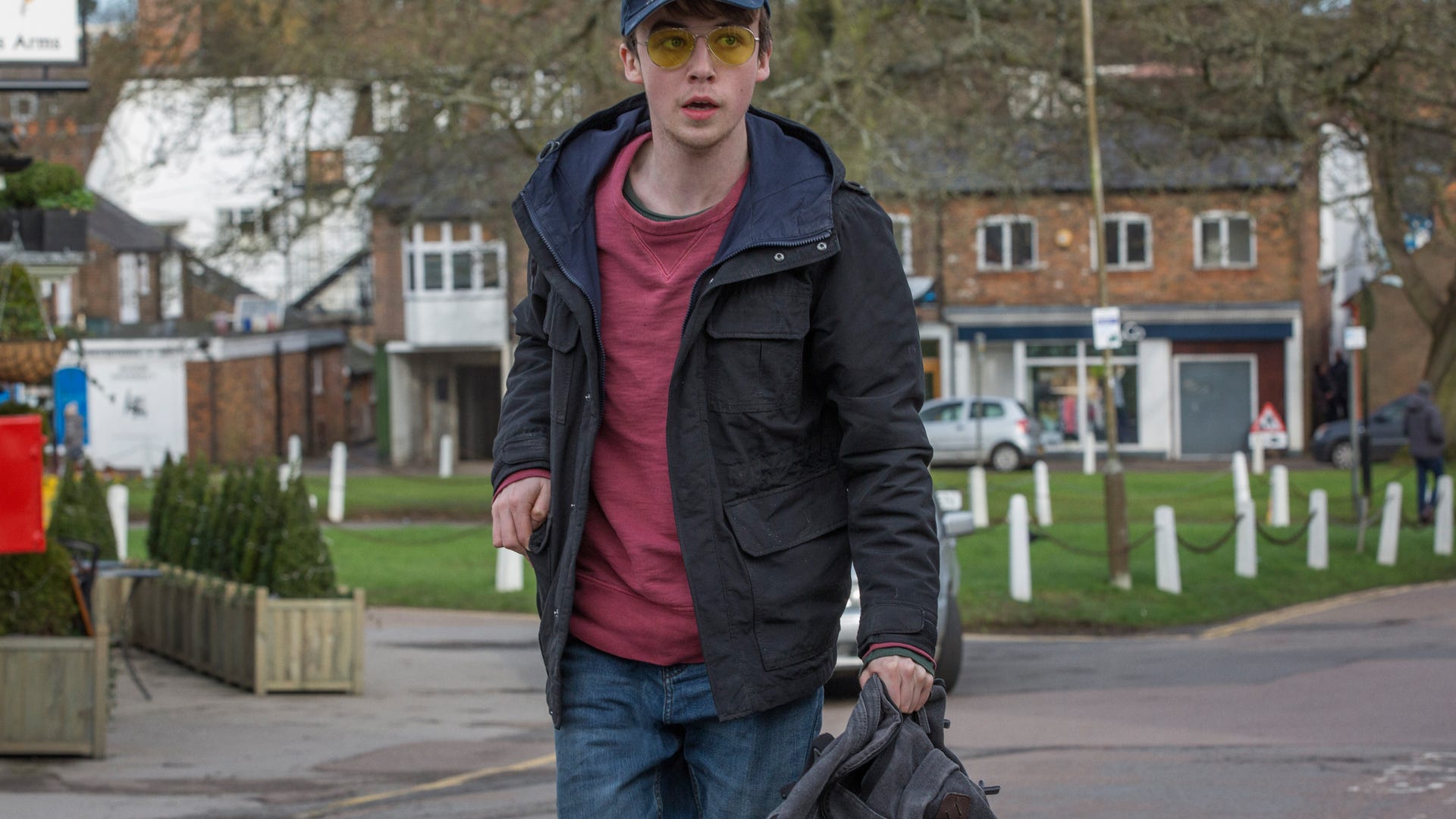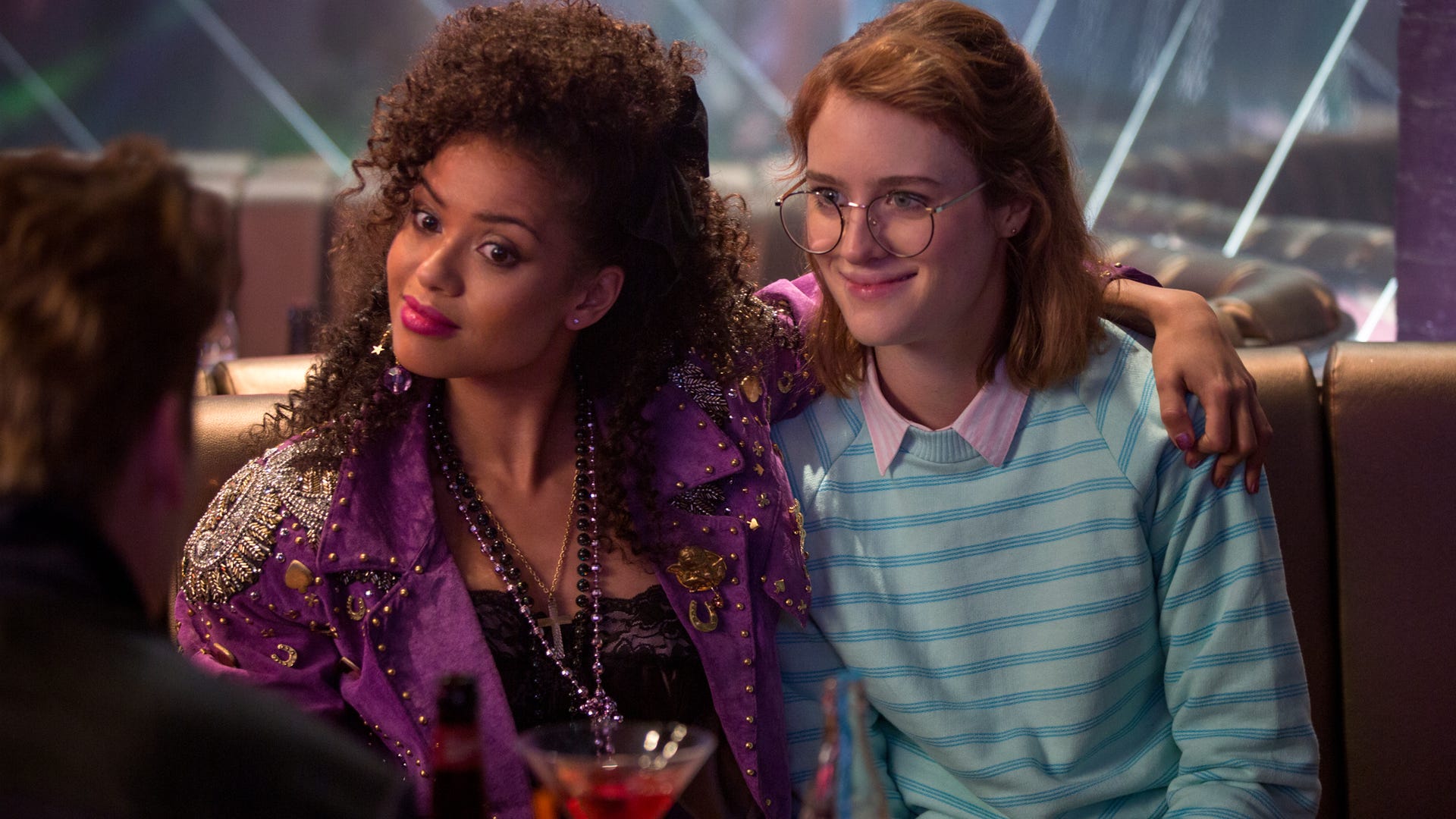Join or Sign In
Sign in to customize your TV listings
By joining TV Guide, you agree to our Terms of Use and acknowledge the data practices in our Privacy Policy.
The Excellent Black Mirror Exaggerates Our Bad Habits Into Technological Nightmares
Here's how each story relates to our mundane and near-tragic lives.
(Warning: spoilers about Black Mirror Season 3 ahead!)
"I didn't expect to find myself living in the future, but here I f---ing well am." That's what Kelly Macdonald's character says in the Black Mirror Season 3 episode "Hated in the Nation," and it may as well be a warning for all of us.
Charlie Brooker's new Netflix series -- which originally debuted two seasons on the U.K.'s Channel 4 before being scooped up exclusively by Netflix for Seasons 3 and 4 -- examines our relationship with technology in (usually) bleak fashion, telling cautionary tales about tech going out of control, mankind's abuse of new technology and how advances in gadgets and gizmos can spell our doom.
The best way to watch Black Mirror is to know as little about it as possible
6. "Hated in the Nation" starring Kelly Macdonald
5. "Men Against Fire" starring Malachi Kirby, Madeline Brewer and Michael Kelly

Malachi Kirby, Black Mirror
Laurie Sparham/Netflix
Brief synopsis: A soldier outfitted with a military-grade AR implant is in his first deployment to help eradicate mutant humans known as "roaches."
Review: It's surprising it's taken Brooker this long to examine tech and its use in the military, but he finally goes hard at it here with an augmented-reality system that makes the enemy look like monsters. Turns out the "roaches" are just regular people on the wrong end of an ethnic cleansing, and the military needed its soldiers to believe they were doing the right thing. How's that for twisted? What's great here is Brooker's stance on war and how the military is brainwashed not just in the field of battle, but as they come home, too, as seen when Stripe (Kirby) returns home after being discharged and is met by the digital hallucination of his presumed girlfriend back home. Was she part of the implant to give soldiers worth something fighting for? Did she ever exist at all? It seems unlikely as every soldier was having similar dreams. This episode, one of Brooker's most political, was messed up, man.
Real-life tech and behavior that led to "Men Against Fire": Oh it's out there, but the military doesn't want you to know. And don't think the government wouldn't try this. Remember Project MKUltra?
Possibility this can happen to you in real life: I wouldn't count it out, but at that point we should all just give up and pray for the meteor to hit us.
4. "Nosedive" starring Bryce Dallas Howard

Bryce Dallas Howard, Black Mirror
David Dettmann/Netflix
Brief synopsis: In a world where social status is determined by interpersonal reviews, Lacie (Howard) strives to get as close to that perfect 5-star mark as she can through positive feedback of others. But when a prime opportunity to raise her status arises, she does everything she can to be a part of it.
Review: At over an hour long, this is one of the longer episodes from the new crop of Black Mirror and it feels like it. There's some meandering here, particularly in Lacie's doomed trip to Port Mary, and it leaves the episode as a whole trying to tie itself together for most of its run. But it's still a fascinating watch for two major reasons: It's the best-looking episode of Black Mirror since Season 1's "15 Million Merits," full of pastels and cool tech with wonderful UI; and Bryce Dallas Howard, who is incredible as the pathetic try-hard who giggles her way through life until she begins to see the light. What's weird is "Nosedive" is so on-the-nose -- we're obsessed with social statuses! -- yet ultimately never satisfyingly drives home its point that there's a better world out there. Still, Joe Wright's direction, Howard's performance and a perfect score make it entrancing and one of the more memorable episodes the series has given us.
Real-life tech and behavior that led to "Nosedive": It's Yelp for people, basically (an idea that actually exists but has never caught on, thank the lord.com). And obviously "Nosedive" hammers home the idea that the selves we portray online aren't actually who we are. But the more subtle human aspect of "Nosedive" involves the way social media has continued interpersonal bonds -- and the strong desire to be part of the in crowd -- that otherwise would have withered away due to time and distance apart. There's a perpetual high-school popularity contest at the heart of "Nosedive" and many of our social-media accounts, something that only exists in our society today now that we're still Facebook friends with half of our homeroom class from sophomore year.
Possibility this can happen to you in real life: In some ways it's already here.
3. "Playtest" starring Wyatt Russell

Wunmi Mosaku, Wyatt Russell, Ken Yamamura; Black Mirror
Laurie Sparham/Netflix
Brief synopsis: An American visiting Europe beta tests some new technology. Surprise, it does not go well.
Capsule review: This episode is different from some of the others in that you don't even see the scary tech the episode's highlighting until about halfway through. It's probably the most linear of the new bunch in that regard. Instead, the focus of "Playtest" really is on Cooper (Russell) and his mental deterioration after subjecting himself to something I would never in a million years do: play an augmented reality survival-horror game created by a Japanese sadist. It works because we're drawn into Cooper's adventure and his happy-bro-lucky attitude (Russell is yet another amazing performance in this season), so his fall hits so much harder. And the final minutes where reality isn't what it seems like three times in a row is frightening. Not an essential episode of Black Mirror because there isn't a lasting message, but one of the funniest episodes of the series before taking a late sick turn. I probably have this ranked higher than most, but it's the best at showing off Brooker's dark humor and his ability to have fun torturing people.
Real-life tech and behavior that led to "Playtest": It's mostly the future of augmented reality (Pokemon Go can turn into this?), which is fairly limited right now in practical applications and public use. Ultimately it's about virtual reality -- Cooper spent days in his scary "test," which in reality only lasted 0.04 seconds -- which is picking up big steam and commercial success as I type these words.
Possibility this can happen to you in real life: It's hard to imagine virtual reality making the technological jump to get to this extreme point without proper safeguards and safety measures. But then again, you can go buy a gun on your way to the supermarket.
2. "Shut Up and Dance" starring Alex Lawther and Jerome Flynn

Alex Lawther, Black Mirror
Laurie Sparham/Netflix
Brief synopsis: A young man named Kenny (the wonderful Lawther in a star-making performance) finds himself blackmailed by a band of online bandits, and must perform a series of tasks or have a secret leaked to everyone he knows.
Capsule review: Whoa, this one is dark. And brilliant! The episode quickly establishes Kenny as a kind everyman whose otherwise innocent life is routine until online hackers film him having valuable alone time with his laptop and a XXX porn site. Not only does it set up the idea that no one is without their own kinks or quirks -- Kenny crossing paths with several other victims shows everyone has secrets that the online world is privy to -- it also exhibits how we've lost control of privacy as we move towards an all-digital life. Suspenseful, gripping and terrifying, this one is a beast. But the fantastic twist at the end -- that these blackmailers didn't want anything but to see these people's lives ruined -- underlines the idea that we're all just victims in wait as the online world, once thought to be a haven for sharing information, has instead become a playground for anonymous meanies.
Real-life tech and behavior that led to "Shut Up and Dance": Don't worry, you aren't the only person who has looked up something self-incriminating on the internet before. And you aren't the only person to scramble to delete your browser history in case someone else saw your web footprints. "Shut Up and Dance" takes that idea a step further by asking what we would do to cover up those tracks; for Kenny, it turned out to be a lot. The episode also looks at anonymous online trolls (signified by the famous troll face meme) who live to ruin other people's lives for no other reason than the lolz.
Possibility this can happen to you in real life: Umm, it's already happening to people. Remember to use Incognito mode and put tape over that webcam, people.
1. "San Junipero" starringGugu Mbatha-Raw and Mackenzie Davis

Gugu Mbatha-Raw, Mackenzie Davis; Black Mirror
Laurie Sparham/Netflix
Brief synopsis: A love story that transcends decades, life and death.
Review: Holy heartache! "San Junipero" is entirely unique even by Black Mirror standards because it's so disorienting right from the start yet remains solidly connected and engrossing through the burgeoning love story between Kelly (Mbatha-Raw) and Yorkie (Davis). Forget that they're both women, forget that they're interracial, forget that they're both dying people uploaded into a fantasy retirement world where the dead can live in the afterlife. Just pay attention to their love, which helps the shy Yorkie -- a quadriplegic vegetable -- come out of her shell and the wild Kelly -- a widow dying of cancer who lost her daughter at 39 -- move on from her tragic past. It's classic storytelling cleverly told through several synthetic decades reiterating that love is timeless, and it's brought to life by Mbatha-Raw and Davis (what's with all these amazing performances this season!?!?). It's also the rare episode of Black Mirror that has a truly happy ending, and by the end of the episode as Belinda Carlisle's "Heaven on Earth" was playing while we saw Kelly and Yorkie on the dance floor and their uploaded cogs dancing with lights in a high-tech facility I was convulsing with tears. A truly remarkable episode of television. A+.
Real-life tech and behavior that led to "San Junipero": This seems more based on massively-multiplayer social games, like Second Life, more than it does virtual reality. But the stirring question here is about the possibility of playing God and creating our own afterlife. WHOA. I mean, why not?
Possibility this can happen to you in real life: Hate to break it to you, but nil. Death is final, and no amount of technology will stop it.
Black Mirror is currently streaming on Netflix.
